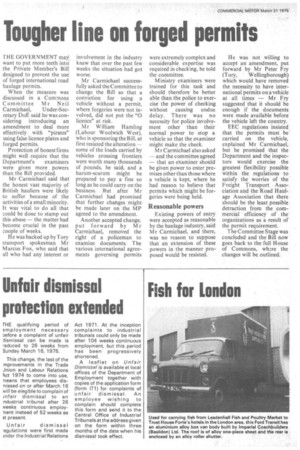Tougher line on forged permits
Page 26

If you've noticed an error in this article please click here to report it so we can fix it.
THE GOVERNMENT mayl want to put more teeth into the Private Member's Bill designed to prevent the use of forged international road haulage permits.
When the measure was discussed in a Commons Committee Mr Neil Carmichael, U nder-S ecretary DoE said he was considering introducing an amendment to deal more effectively, with "pirates" Using false licence plates and forged permits.
Protection of honest firms might well require that the Department's examiners were given more powers than the Bill provided.
Mr Carmichael said that the honest vast majority of British hauliers were likely to suffer because of the activities of a small minority. It was vital to do all that could be done to stamp out this abuse — the matter had become crucial in the past couple of weeks.
He was backed up by Tory transport spokesman Mr Marcus Fox, who said that all who had any interest or involvement in the industry knew that over the past few weeks the situation had got worse.
Mr Carmichael successfully asked the Committee to change the Bill so that a conviction for using a vehicle without a permit, where forgeries were not involved, did not put the "0 licence" at risk.
Mr William Hamling (Labour Woolwich West), who is sponsoring the Bill, at first resisted the alteration — some of the loads carried by vehicles crossing frontiers were worth many thousands of pounds, he said, and a harum-scarum might be prepared to pay a fine so long as he could carry on the business. But after Mr Carmichael had promised that further changes might be made later on the MP agreed to the amendment.
Another accepted change, put forward by Mr Carmichael, removed the right of a policeman to examine documents. The various international agreements governing permits were extremely complex and considerable expertise was required in checking, he told the committee.
Ministry examiners were trained for this task and should therefore be better able than the police to exercise the power of checking without causing undue delay. There was no necessity for police involvement other than their normal power to stop a vehicle so that the examiner might make the check.
Mr Carmichael also asked -and the committee agreed — that an examiner should be given power to enter premises other than those where a vehicle is kept, where he had reason to believe that permits which might be forgeries were being held.
Reasonable powers
• Existing powers of entry were accepted as reasonable by the haulage industry, said Mr Carmichael, and there, was no reason to suppose that an extension of these powers in the manner proposed would be resisted. He was not willing to accept an amendment, put forward by Mr Peter Fry (Tory, Wellingborough) which would have removed the necessity to have international permits on a vehicle at all times — Mr Fry suggested that it should be enough if the documents were made available before the vehicle left the country.
EEC regulations insisted that the permits must be carried on the vehicle, explained Mr Carmichael, but he promised that the Department and the inspectors would exercise the greatest flexibility possible within the regulations to satisfy the worries of the Freight Transport Association and the Road Haulage Association that there should be the least possible detraction from the commercial efficiency of the organizations as a result of the permit requirement.
The Committee Stage was concluded and the Bill now goes back to the full House of Commons, whore the changes will be outlined.








































































































































